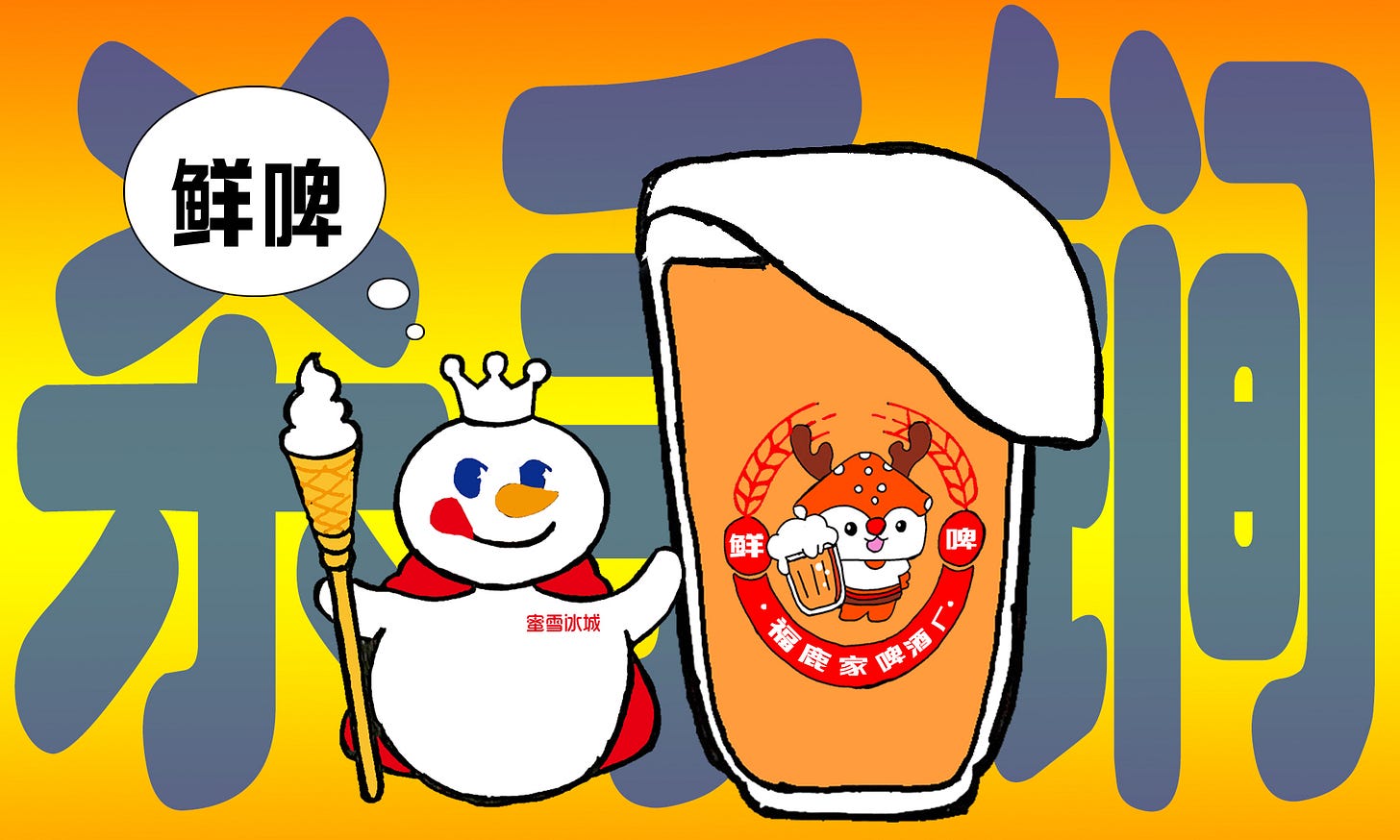Welcome to RealTime Mandarin, a free weekly newsletter that helps you improve your Mandarin in 10 minutes a week.
Subscribe today to get your fluency back, stay informed about China, and communicate with confidence in Chinese — all through immersion in real news.
China’s largest budget tea chain has made a surprising move into craft beer.
The company is Mixue Bingcheng (蜜雪冰城), which is also known as the “Snow King” (雪王) — a reference to the snowman mascot in its logo. Mixue sells milk teas, fruit teas, ice cream, smoothies, and bubble teas at affordable prices typically ranging from 3 to 8 yuan.
Mixue has scaled aggressively through its franchise model. Its vast and efficient operations have led many commentators to describe it as a supply chain company, not just a milk tea brand.
As of June 30, 2025, Mixue’s global store count had reached 53,000 — more than China’s seven other major tea brands, including Guming (古茗茶饮) and Chagee (霸王茶姬), combined.
Mixue has also built Lucky Cup (幸运咖), a coffee chain with over 9,000 stores. Lucky Cup used the same low-price, lower-tier-city-first strategy. This is often described as “encircling the cities from the countryside” (农村包围城市) — a Mao-era slogan now frequently applied to modern Chinese business expansion.
Mixue’s recent investment into booze might offer a new source of growth.
On October 9, Mixue announced it was acquiring a 53% stake in Fu Lu Jia (福鹿家), a craft beer chain, for 297 million yuan ($41 million USD). This move is described by some as Mixue playing its “third card” (第三张牌) — after tea and coffee.
A closer look at this investment suggests it is not a surprise at all.
Fu Lu Jia was co-founded by Tian Haixia (田海霞), the wife of Mixue’s CEO, Zhang Hongfu (张红甫). Despite the obvious conflict of interest, investors so far seem unbothered by this link. The deal appears to have been fairly priced, and strategically, the acquisition makes perfect sense.
Fu Lu Jia launched in 2019 originally as a convenience store chain in Henan Province. In 2021, the business pivoted into craft beer (which in Chinese is 精酿啤酒 or 精啤 for short).
At that time, the company recognised a fundamental problem in the market: many young Chinese consumers find traditional beer too bitter or heavy. So Fu Lu Jia’s solution was to create lighter, lower alcohol beers with flavoured options using fruit, milk, and tea. Fu Lu Jia also took the decision to serve fresh draft beer in plastic bags with straws making it easy to take away and even drink on the go.
Fu Lu Jia worked out that young trendy consumers in China don’t want to just get drunk. They want flavoured, low-alcohol drinks so they can get slightly tipsy. Its success in creating this new market has led to a new phrase: “tipsy economics” (微醺经济).
The beer chain’s flagship product, Fu Lu Draft Beer (福鹿鲜啤), sells for 5.9 yuan per jin (which is around one pint). Other offerings like German Wheat beer (德式小麦), Belgian Wheat beer (比利时小麦), and fruit-flavoured beers range from 6.6 to 9.9 yuan.
As one observer put it:
“Fu Lu Jia figured out the solution: connect with young people through taste. Young people like sweet drinks, so they turned fresh beer into a sweet drink.
And finally, beer can be consumed on-the-go like milk tea.”
福鹿家想到的解决方案是从味道上和年轻人拉拉手。年轻人喜欢喝小甜水,那鲜啤就变成小甜水,于是,啤酒终于可以像奶茶一样边走边喝,逛街手里拿一天。
Related
By August 2025, Fu Lu Jia had opened over 1,200 stores in 28 provinces in China. And unlike many investor-fuelled startups burning cash to grow, Fu Lu Jia turned a profit by 2024, achieving 1.07 million yuan in after-tax earnings.
So the business models of Fu Lu Jia and Mixue are similar.
Both companies target budget-conscious young consumers. Both use the franchise model. And both price aggressively.
But freshness is the real differentiator for Fu Lu Jia.
Fu Lu Jia bets on freshness to challenge canned beers sold in supermarkets at comparable prices.
This “fresh-over-prepackaged” strategy is Mixue’s killer move.
福鹿家将”新鲜现制”作为卖点,剑指超市同等价位一罐的”水啤”。用现制”碾压”预制,是蜜雪冰城的杀手锏。
Unlike bottled or canned beer sold in supermarkets, Fu Lu Jia delivers fresh draft beer directly from cold storage into plastic cups or bags — just like Mixue does with tea.
But despite the similarities between the two, replicating Mixue’s tea empire in the craft beer sector won’t be easy.
The market is already crowded for one. Beer is seasonal in ways that bubble tea is not. And maintaining freshness with craft beer quality and taste will also be a challenge as the business continues to scale, as one beer purist suggests:
“It’s difficult to reconcile the ‘tens-of-thousands-of-tons self-built factory’ mentioned on their website with craft beer’s traditional small-batch production.”
官网上所写的“万吨级自建工厂”也很难和精酿的小规模生产划等号。
So, will Mixue play its third card as well as the last two?
That’s what we’re exploring this week!
Favourite Five
1. 跨界 kuà jiè
crossing over into another sector
收购福鹿家并非蜜雪第一次“跨界” - The acquisition of Fu Lu Jia marks yet another step in Mixue’s expansion beyond its core business. [1]
Related:
赛道 sài dào – track, business field
2. 杀手锏 shā shǒu jiǎn
killer move, trump card, secret weapon
用现制“碾压”预制,是蜜雪冰城的杀手锏 - This “fresh-over-prepackaged” strategy is Mixue’s killer move. [3]
More on this phrase in tomorrow’s Sinica Phrase of the Week!
3. 如出一辙 rú chū yì zhé
exactly the same, identical approach
蜜雪冰城推出咖啡品牌幸运咖时,打法与如今布局鲜啤如出一辙,同样以极致低价破局 - When Mixue launched Lucky Cup, it disrupted the market through aggressive pricing, which closely mirrors its current draft-beer strategy. [2]
4. 微醺经济 wēi xūn jīng jì
tipsy economics, light alcohol consumption trend
瞄准年轻人微醺经济,雪王入局啤酒生意 - Targeting young consumers who increasingly prefer light alcohol, Mixue is making a strategic move into the beer business. [2]
5. 一招鲜,吃遍天 yì zhāo xiān, chī biàn tiān
one trick that works everywhere, relying on one strong advantage
越往后,品牌竞争越考验品牌、产品、组织、供应链等综合实力,不是一招鲜吃遍天 - Going forward, success will increasingly depend on a brand’s overall capabilities, including product innovation, organizational efficiency and supply chain management, rather than on any single advantage. [1]
🎧RTM Podcast Preview
This week on the RTM Advanced podcast, we explain three key phrases used in business conversations.
All have the sound “ju” in them — but each one is a different character and means something different!
“Dominate” 盘踞 pán jù
“Divide and rule” 割据 gē jù
“Strategic landscape” 格局 gé jú
Tune in at 7 minutes where we break down what they mean…
How native speakers use them…
And how you can use them in real conversations right now to show off your amazing Chinese!
Consuming the Conversation
💡 Ready to get inspired to bridge the gap to real-world fluency? 💡
In every RTM Advanced post you unlock content and tools to inspire you, and help you get fluent.
So, ready to finally get started and wave goodbye to that nagging rusty feeling?
Let’s jump in👇
Consuming the Conversation
Useful words
6. 契合 qì hé
fit well, align closely
强调新鲜现制以及高性价比的大众定位,与蜜雪冰城的客群画像高度契合 - Fu Lu Jia’s comparative advantage in freshness and affordability fits well with Mixue’s customer base. [2]
Related:
趋同 qū tóng - converge, become similar
7. 黑马 hēi mǎ
dark horse, unexpected rising star
福鹿家更是凭借迅猛的扩张速度成为赛道黑马 - Fu Lu Jia has become a dark horse in the field thanks to its rapid expansion. [2]
8. 算盘 suàn pán
abacus, plan or calculation
选择此时收购福鹿家,蜜雪冰城的算盘较清晰 - The timing of Mixue’s acquisition of Fu Lu Jia reveals a clear strategic intent. [2]
9. 平价 píng jià
affordable, low-priced
把万店加盟体系以及冷链网络的资源复制到新领域,试图在鲜啤市场再造一个“平价之王” - By replicating its vast franchise and cold-chain network, it aims to become the “king of affordability” in the draft beer market. [2]
10. 盘踞 pán jù
entrenched, dominate
消费场景、原料保鲜,以及早已盘踞的传统啤酒巨头与新兴连锁品牌,都在考验其跨界能力 - Mixue’s success in the draft beer market is being challenged by factors such as drinking occasions, ingredient freshness and the dominance of established beer incumbents alongside rising chain brands. [2]
11. 割据 gē jù
divide and rule, dominate separately
便利店赛道已是巨头割据的红海 - The convenience store sector has already become a red ocean market dominated by major players. [2]
12. 复刻 fù kè
replicate, copy
从运营模式看,它也复刻了奶茶店的轻量化 - From an operational perspective, it also replicated the lightweight model of milk tea shops. [2]
Related:
复制 fù zhì - copy, duplicate
13. 偷师 tōu shī
learn secretly, imitate
这一套也被卖酒的福鹿家偷师,菠萝啤、西柚啤,前面还标着“低卡” - This approach was secretly imitated by Fu Lu Jia, which also launched pineapple beer and grapefruit beer—all labelled “low-calorie”. [3]
14. 精酿 jīng niàng
craft beer
福鹿家卖的根本不是精酿 - What Fu Lu Jia sells isn’t craft beer at all. [3]
Related
鲜啤 xiān pí - draft beer / fresh beer
水啤 shuǐ pí - bottled or canned beer (literally “watery beer” - slang term implying it’s diluted or low quality compared to fresh draft)
15. 格局 gé jú
structure, landscape
此番收购,是其有意开拓现打鲜啤品类,完善其“高质平价”的品类布局,形成“现制茶饮+现磨咖啡+现打鲜啤”的多品类协同格局 - With this acquisition, Mixue is moving into draft beer to round out its product portfolio of “premium quality at affordable prices”, which creates a multi-category synergy across tea, coffee, and beer. [4]

















